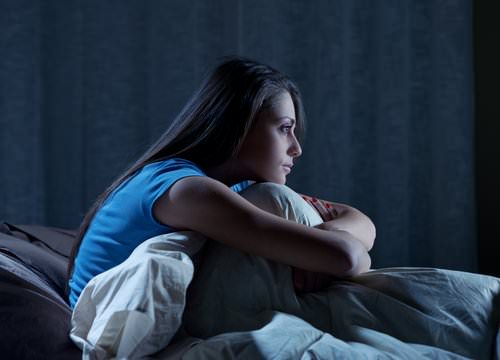Why do you wake up at three in the morning?
In fact, many people wake up at three in the morning or a little later. Far from being a mystical or supernatural phenomenon, this is a very common problem caused by sleep disturbances associated with anxiety.
However, this phenomenon should be explained in detail so that you can better understand and counter it. Getting up during these hours early in the morning and not being able to sleep can be a very serious problem if it happens over several days. Therefore, it is important to know how to properly deal with the situation.
There are many publications that describe this common phenomenon. However, it is worth remembering that there is nothing surprising in it; it is actually the brain's reaction to the heightened level of anxiety that we are feeling at that moment. When it starts to permanently disturb our sleep, we need to take appropriate measures.
It is important to be aware of the symptoms that often accompany getting up at three or four in the morning:
- Awakenings from intense anxiety and restlessness.
- Rapid heartbeat and sense of danger.
- Return to sleep is impossible. It increases nervousness, negative thoughts and insomnia.
- If you do manage to fall asleep again, the sleep is very light and you wake up feeling tired.
- You wake up at three or four in the morning several times a week.
Anxiety and excitement in the early hours of the morning
Why do I always wake up at 3am?
If during the week you suddenly wake up early in the morning and almost always at this time, first ask yourself if something is bothering you, or something is bothering you, or you are working too much, there are emotional problems.
All of these factors can cause anxiety that we often don't even realize, but our brain responds to these issues through sleep. We have trouble falling asleep, and when we eventually fall asleep, the accumulated anxiety makes us wake up feeling threatened.
Let's look at the problem in more detail:
- Anxiety directly affects the central nervous system (CNS), which begins to make small changes in the bio- and neuro-chemical systems involved in the sleep-wake cycle. All this directly changes the stages of sleep (REM and deep).
- As a rule, we go to bed and it is difficult for us to fall asleep. We eventually fall asleep around midnight, but anxiety fragments our sleep, making it difficult for us to reach the REM stage when sleep is deep and restorative.
- Our brain interprets this anxiety as a threat and something we need to get away from. Feeling this warning makes us have a hard time waking up around 3 am.
- This is the body's natural response to anxiety and our neurotransmitters are altered, causing changes in sleep patterns.
How can I solve this problem?
If anxiety is the cause of sleep disturbances, we must confront these sources of stress and the issues that cause anxiety in order to get a good night's rest.

- It is important to realize that something is happening. Waking up in the middle of the night feeling fearful or threatened is a sign that something is wrong. Ask yourself what it is, why this is happening in your life, what worries you, what makes you unhappy, and why you feel insecure.
- Make small changes in your life, set priorities, and try to develop new habits to stimulate your brain and avoid stress.
- Try to walk after dinner for at least half an hour. Walk, breathe deeply, shut out the world, relax.
- When you get home, take a bath and go to bed. You should not scroll in your head: “I need to sleep well all night in order to work well tomorrow.” This thought creates tension in the brain, because it sees it as an obligation: "I must sleep."
- Gain mental clarity and calm your thoughts.
- Make sure your room is clean, well ventilated and smells fresh. According to experts, the best temperature for sleeping is 20°C. When the temperature exceeds 25°C, the body feels uncomfortable. Remember this!











